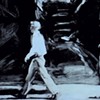Published March 26, 2003 at 2:05 p.m.
In an age of multiculturalism and globalization, it's not all that surprising that a show about Mongolia should make its way to Middlebury. But this is still an unusual exhibition.
On the positive side, "Modern Mongolia: Reclaiming Genghis Khan" offers a refreshing departure from standard art-museum fare. Instead of framed images hung on walls, the show is organized around three life-size models of gers, also known as yurts. These cozily furnished tent dwellings can be put up or taken down in an hour or so, making them an ideal form of housing in a nation once composed mainly of nomads. Gers are apparently still common in Mongolia's countryside, though about half the country's 2.4 million inhabitants now live in or near the capital city of Ulaanbaatar. And judging from photos in the show, soulless apartment blocks seem to be what most Mongolians now call home.
In Middlebury, part of the gers' felt covering is pulled back -- just as would be done in central Asia during summer -- to reveal dioramas of families surrounded by handmade housewares and decorative items.
A museumgoer who has never seen either the outside or inside of a ger may find the show's centerpieces fascinating. They certainly make for an exotic spectacle on a college campus in northern New England.
Also of interest are display cases containing the costumes of a Buddhist lama and a traditional shaman. The latter garment is a funky combination of animal skins, silk, metal, claws and eagle feathers.
But that's about all the exhibit provides in the way of aesthetic pleasure. "Reclaim-ing Genghis Khan" is actually more an essay on anthropology than a display of artistry. The verbal overwhelms the visual, and amid the welter of wall texts the show stops being simply unusual and becomes downright odd.
Much of the information on Mon-golia's history is tendentious or didactic. Visitors may feel as though they've wandered into a state-sponsored lecture that could be entitled "Genghis Khan: The George Washington of the Steppes."
The show's co-organizers, the National Museum of Mongolian History and the University of Pennsylvania Museum of Archaeology and Anthropology, keep flogging the thesis that Genghis Khan established a proto-democracy in the early 13th century. This revisionist history makes only passing and vaguely dismissive mention to Genghis' reputation as a bloodthirsty marauder; heavy emphasis is instead placed on contemporary Mon-golians' view of their nation's founder as a political visionary.
Maybe Genghis really has gotten a bad rap from those who chronicled his conquests. Perhaps he does deserve to be seen as more than merely the architect of the largest empire in human history. But there's still something creepy and cultish about the show's insistence on attributing modern ideals of governance to a medieval emperor.
In a recent show at New York's Metropolitan Museum of Art on Genghis' artistic legacy, no such claims were made about his enlightened rule. In Middlebury, however, we're told that not only have Mongolians "revered democratic principles for over 800 years;" we're further informed that Genghis got into democracy before any Europeans managed to move in that direction. Because the show dates the founding of democratic Mongolia from 1206 -- the year Genghis unified various local tribes -- the curators boast that this breakthrough predates England's Magna Carta by nine full years.
The show also takes a rather curious approach to the period when Mongolia was aligned with the Soviet Union. While it's understandable that Mongolians might be grateful for the Bolsheviks' help in expelling Chinese occupiers in 1921, is it really accurate to portray the subsequent relationship between the USSR and Mongolia as an alliance of equals? "Sat-ellite of Moscow" would probably be a more apt description of Mongolia during its Red phase.
"The Communist government -- with help from its Soviet allies -- accomplished a lot in Mongolia," the show's visitors are told. Maybe so. As the curators explain, the communists destroyed feudalism, promoted economic development, and raised literacy rates and health-care standards. One does wonder, though, about the outcome of the attempt to turn nomadic herders into collectivists. There's also the matter of the 36,000 Mongolians murdered in purges from 1933 to 1953.
The show's straight-faced display of Stalinist kitsch probably isn't intended as the driest of irony. Along with propaganda posters of virtuous workers and valorous horsemen, visitors are treated to a glimpse of communist workers' medals, including the "Glorious Mother, Rank One" award handed out only to women who produced at least eight offspring.
Of course there's nothing wrong -- and there can be a lot right -- about attacking stereotypes of an unfamiliar culture and of a historical figure whose biography is based more on guesswork than on facts. It might even be OK, in a provocative sort of way, to depict Soviet-style communism as essentially progressive. But in order to be persuasive, such endeavors have to be carried out with a light touch, not the heavy hand that weighs down the show in Middlebury.
More By This Author
Speaking of...
-

Q&A: Catching Up With the Champlain Valley Quilt Guild
Apr 10, 2024 -

Video: The Champlain Valley Quilt Guild Prepares for Its Biennial Quilt Show
Apr 4, 2024 -

A Multilayered Career Leads a Seasoned Chef to Middlebury’s Swift House Inn
Mar 12, 2024 -

Middlebury: What to See, Do and Eat During the Eclipse
Mar 6, 2024 -

Middlebury's Champlain Valley Creamery Marks 20 Years With a Milestone Cheese
Feb 27, 2024 - More »
Comments
Comments are closed.
From 2014-2020, Seven Days allowed readers to comment on all stories posted on our website. While we've appreciated the suggestions and insights, right now Seven Days is prioritizing our core mission — producing high-quality, responsible local journalism — over moderating online debates between readers.
To criticize, correct or praise our reporting, please send us a letter to the editor or send us a tip. We’ll check it out and report the results.
Online comments may return when we have better tech tools for managing them. Thanks for reading.














































